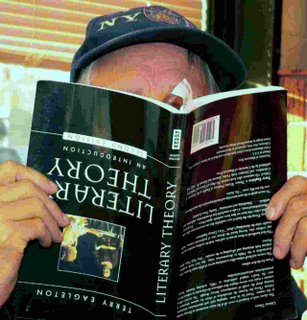Big Versus Small Press Publishers: Writers Prefer Support to a Cash Advance for Their Latest Title
Recently, the Canadian book blog Bookninja blogged US blogger Maud Newton's piece under a title that should have been edited to read "Maud examines the recent trend of big time authors who opt for "small"(er) publishers."
My edit was made to reflect the fact that these publishers are only relatively 'small'; relative to the majors who had already printed and distributed umpteen other, earlier titles by said major authors cited in the source articles Maud used for her own post.
Somehow (duh!) Bookninja blogging a US blog to run in Canada and using the words Small Press Publisher in the first paragraph is misleading. At least when the subject is really about top-name-recognition US authors. This fact means this small press talk is all about promotion and distribution within the Big Leagues of Fiction Titles, where book promotions costing tens of thousands (if not hundreds of k) are common practise.
From 'Maud' via Bookninja:
Increasingly, even established writers like Kurt Vonnegut are looking beyond big-name publishers. They’re signing small press deals that guarantee heightened publicity and higher royalties; in return the authors accept drastically reduced advances.
I just switched from a fairly big name press to a small one for my next book. It’s a different story for us poets, but it comes down to the economics of the whole thing. The decision was partly political, partly practical. If you’re treated like afterthought dirt at even the largest press, you’re still just afterthought dirt. Besides the increased production values and care given by smaller presses, you also get more personal attention from the people trying to sell books. They really care about what they’re publishing and do nothing out of habit. This is the advantage of living so close to the edge. It keeps the senses sharp. At my former press, poetry is really just a charity program that’s now done out of habit. They do believe in it, in principle, but have no resources or time to devote to it when there are lucrative fiction and nonfiction titles to promote. So four books a year get published and left to stand on their authors’ reputations. However, if you’re still developing that reputation….. So, what’s the point of having all that name-brand muscle behind you if no one lifts a finger to help? And regardless of where we poets go, we all have drastically reduced advances.
Posted by George of Bookninja
If a reader using a browser goes behind the blogs to check out the articles cited, we discover an honest cynicism regarding any new title being promoted by the book biz:
From The Boston Globe
A book and its cover
The work of fiction in the age of blockbuster publishing
By Sven Birkerts | December 17, 2006
Cynical, yes, but I go to bookstores, I keep tabs; I've seen what happens to megaliths like National Book Award-winner Norman Rush's "Mortals" (712 pages), or (Indian novelist Vikram Chandra's) countryman Vikram Seth's "A Suitable Boy" (1,488 pages!). They loom in forbidding ziggurats for a month or so, then they are returned, to be bought up by remainder houses, whereupon they loom again . . .
. . . Writing might be the most solitary and soul-concentrated of vocations, but once a book enters the publishing sluice, it is a collectively-finessed object -- and the greater the investment, the more finessing.
Then there's the genre factor. "Sacred Games" (by Vikram Chandra) may be a work of high literary ambition, but it also offers a lovely hook. Bombay (Mumbai) noir. The novel tracks the progress of a world-weary cop through the labyrinths of the city's gangland underworld. The descriptions have it thick with seamy texture, with criminals and harlots high and low.
I have to keep pinching myself (up until the moment I read the dollar figures being bantied about when discussing these novels) to remind myself that the subject is US and not Canadian publishing with all this multi-ethnicity. I even let myself be mislead into believing that a bookblogger named 'Maud' had to be a Canadian by name if by nothing else!
The clincher regarding the sort of Small Press being examined (and proof that we do not need a microscope for this investigation) is abundantly offered in the following citation taken from one of the sources in the mainstream media for all this blog commentary above:
From The Wall Street Journal
"Traditional publishing functions as an assembly line," says Mr. Morrell (a writer of thrillers, including 'Scavenger').
"Often by the time a book is published the project has gone through various departments and the memory of why certain decisions were made weren't passed along, so nobody can understand what's going on." By contrast, Mr. Morrell says he is involved in every step of the marketing at Vanguard, which plans on publishing only one or two books a month for the near future.
Vanguard says it is responding to the rapid-fire changes that have given the once-sleepy publishing world a distinctly casino-like atmosphere. Increasingly these days books have only a week or two to establish themselves as big hits; otherwise they're quickly washed to the back of the store.
"Publishing is now very much like opening weekend grosses in the movie business, it's about exploding out of the box and selling as many copies as quickly as possible," says Roger Cooper, Vanguard's publisher.
Although such writers as James Patterson, Mitch Albom and Mr. King have been able to successfully ride that wave, many authors with good track records and established fan bases have been cut adrift, he says. Often their publishers are forced to concentrate on each season's biggest bets.
Such authors may still sell well, but often they feel under-published. Vanguard, by contrast, says it focuses on marketing its books three months before publication -- and then three months after publication. In theory, this means writers will have a richer opportunity to reach their fans."
Being published by a Small Press within Canada's borders does not mean that an author's book is out of the running for winning a major literary or nonfiction award, either nationally or internationally. But it does mean that the publisher cannot afford the 'richer opportunity to reach their fans' as meant by the Wall Street Journal piece quoted above. That is if the number of 'their fans' starts getting above a four- or modest five-digit figure.



No comments:
Post a Comment